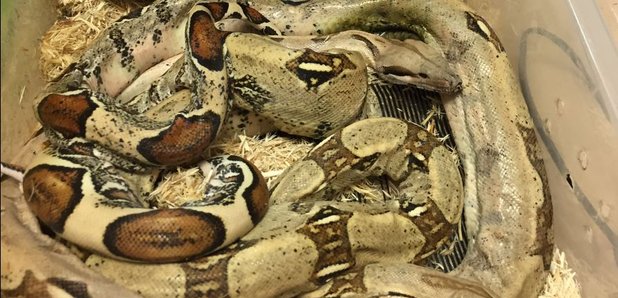Exotic pets abandoned in Wiltshire
25 April 2019, 09:15 | Updated: 25 April 2019, 09:17

New figures show the RSPCA received more than 145 calls about neglected, abandoned and stray exotic animals last year in Wiltshire
The RSPCA believes the reason behind some of the suffering of these exotics pets is that owners do not research their needs using expert sources and don't understand the type and amount of care that they need, resulting in them escaping, being abandoned or neglected.
Scientifically-based expert care information for exotic animals can be hard to find and an inexperienced owner may not be able to tell the difference between quality and inaccurate care information.
The bodies of two dead snakes were found dumped in a plastic box in Swindon, Wiltshire.
The shock discovery was made by a member of the public who found the bodies of the boa constrictors in Pinehurst Road in January 2018.
The two snakes, who were found in the box alongside a heat mat and bowl, were both between 1.5m and 2m in length.
RSPCA Deputy Chief Inspector Stephanie Daly said: "It's heartbreaking to think that someone could simply discard these poor snakes like rubbish next to garages in a residential street.
"Both snakes were underweight and in poor condition and veterinary experts believe they sadly suffered before their deaths."
Another unusual and upsetting discovery was made in Wiltshire in April 2018 when Giant African land snails were rescued after being callously dumped by the side of the road in Trowbridge.
RSPCA Animal Welfare Officer Sian Fry saved the snails, who had been dumped alongside a tank, before they were taken to the RSPCA's specialist rescue centre to begin their search for new homes.
She said: "Giant African land snails are completely reliant upon their owners to be provided with the correct accommodation, heating, humidity, lighting and food. To abandon them alone without consideration for their welfare is completely unacceptable."
Stephanie Jayson, RSPCA's senior scientific officer in exotics and qualified exotics vet, said: "Although their numbers are small compared to more common pets, we have real concerns about the welfare of reptiles and other exotic animals kept as pets in this country.
"Reptiles and other exotic pets are completely reliant on their owners to meet their welfare needs including requiring the correct levels of heat, light and humidity, plus an appropriate diet. Some species can grow very large, live for a long time or require a licence or paperwork to be legally kept or sold. Many of the animals we're called to help are found stray outside, where they can very quickly suffer in the cold.
"These animals are commonly found for sale in pet shops and are advertised online.In the past, animals have often been handed over to buyers with little or no information about how to care for them properly, although new regulations in England should improve this. In some cases, we believe owners take them on simply because they believe they will be easier to care for than other pets, but it is essential that people research what is required in the care of their pet, including food, equipment, environment and vet care, before taking one on. We would also urge them to ask for help if they're struggling to meet their needs.
"We believe that people may buy them with little idea of how difficult they can be to keep and the animals are sometimes neglected when the novelty wears off and the commitment hits home. This is why we would encourage anyone thinking of getting an exotic pet to find out as much as possible about the animal's needs and whether they're the right pet for them."
Find out more here.






















